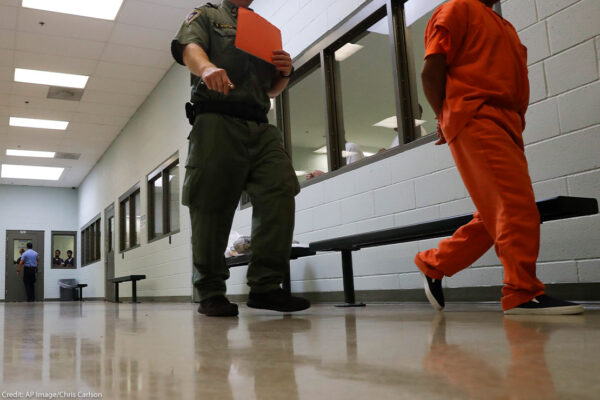This year has been one filled with outrage over the appalling conditions that asylum seekers face while in the custody of Customs and Border Protection (CBP). We’ve read about children and teenagers dying, people being denied medication, and one hielera — or “icebox” due to its freezing temperatures — where some people were reportedly forced to drink out of a toilet.
Now, that very facility is also where the Trump administration is rolling out its newest attempt to destroy the asylum system. For the first time, it is where vulnerable, exhausted people who’ve fled persecution will face the interviews that will determine whether they’re able to pursue their claim for asylum or protection. The purpose is to make it as hard for them as possible by rushing them through the process in horrible conditions, without meaningful access to lawyers.
At the Border Patrol station, located in El Paso, Texas, the government is piloting a new policy where asylum seekers are held effectively incommunicado throughout the asylum screening process. Asylum seeking families and individuals are prevented from reaching attorneys and others who can help them while they are rushed through a “credible fear” interview and review by an immigration judge over the phone. If they don’t pass, they are sent back to the country they’ve fled. That’s it — the whole process starts and finishes within a few days, and it’s all playing out in a Kafkaesque CBP detention site at the border.
If you haven’t heard about this, you’re not alone: the administration secretly rolled out the policy back in October through two programs — “PACR” (for non-Mexican asylum seekers) and “HARP” (for Mexican asylum seekers).
Like so many of the Trump administration’s policies designed to harm asylum seekers, these programs break with decades of agreement that people fleeing threats and violence should have a fair chance to prove they need protection. Never before have asylum seekers been jailed in CBP custody during the credible fear process. That’s because the conditions in CBP facilities are completely incompatible with what’s needed to ensure that the process is conducted fairly.
These facilities have always been short-term jails used to process people who cross paths with Border Patrol. They have never been adequate even for those short-term stays, and they do not provide people detained in them with access to attorneys, family, or the public. People detained in them can’t meet with a lawyer or make regular phone calls. There aren’t even beds, so they must sleep on aluminum blankets, mats, or directly on cold concrete floors. The agency has even said it has “no obligation to notify family or counsel” that it is holding someone.
Before PACR/HARP was launched, asylum seekers in the El Paso area were typically transferred to ICE jails for their credible fear interviews. Those jails are at least required to facilitate access to attorneys and permit calls to family members — though they often fail to do so. The credible fear interview is intimidating — it involves a detailed discussion of what are often the most traumatic moments people have ever experienced — and newly arrived asylum seekers may not understand the purpose or critical importance of the interview. The government has a legal obligation to let asylum seekers work with attorneys in preparing for and going through the credible fear process. CBP detention makes it impossible.
Because of these new policies, asylum-seekers who deserve protection could be wrongly sent back to the countries they fled. It is all but guaranteed that some of them will die as a result.
So we sued. We intend to stop the Trump administration from implementing PACR and HARP. It’s their latest attempt to eviscerate our most basic asylum protections.
Our plaintiffs include two families who are both now hiding in El Salvador after being rushed through the asylum process with no access to an attorney. CBP held them incommunicado in tents and hieleras without beds for days during their credible fear process. They each had only a single thirty-minute window in which to make phone calls to the outside world. Officials gave them a list of lawyers known as “the list of ghosts,” because no one ever picked up or returned their calls.
Since there was no way for attorneys (or loved ones) to call them back or otherwise reach them while they were in CBP custody, and no other opportunities to make phone calls, they went through their credible fear processes alone. No attorney explained to them what was happening or how an asylum officer would be evaluating their case.
Both families fled after gang members threatened to kill them and the Salvadoran police said they could not protect them. Without an attorney, they did not pass their credible fear interviews. The government put them on a plane back to El Salvador, where they are now hiding in fear from the gangs they fled, afraid to even leave the place in which they are living.
This administration is systematically destroying our longtime commitment to asylum. We must fight back. People seeking safety in the U.S. deserve a meaningful opportunity to plead their case before being sent back to danger and possible death — both the law and our values require it.
Kate Huddleston, Equal Justice Works Fellow, ACLU of Texas

